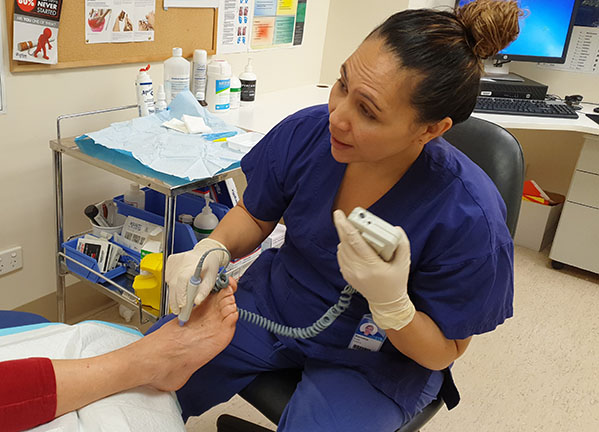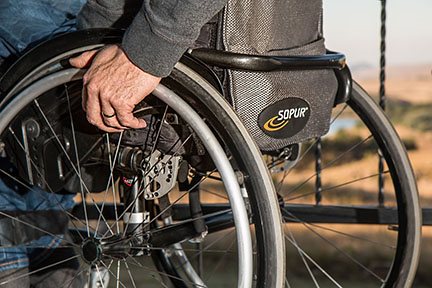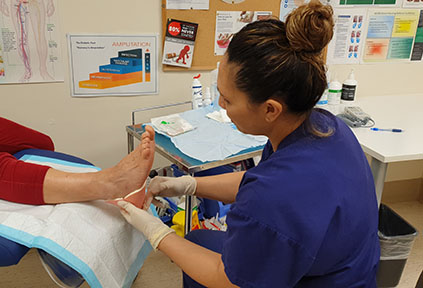Why would you want a career .... dealing with grotty feet?

You expect feet to be smelly, spongy or discoloured, but to lose a patient’s toe while you are chatting to them takes the work of a specialist podiatrist to a whole new level, says High Risk Foot Clinic Specialist Podiatrist Ramona Frost.
“Nothing can prepare you for something like that! It was early on in my job at the clinic and I had removed the patient’s shoe and thought, 'Oh, the big toe is missing.' Next minute, I realised it was in the patient’s sock. I freaked out at the time.”
While it took a few weeks for Ramona to overcome a sense of panic when facing a bad wound, she pushed through and stayed committed to her role because of her supportive team and a very, very strong belief in the importance of helping prevent amputation for people with diabetes.
“If it is truly your passion and where you want to be, you push through those initial feelings and there is always your team there to support you,” says Ramona who has been working for the Auckland District Health Board High Risk Foot Clinic as a specialist diabetic podiatrist for the past two years.
Choosing to deal with feet needing specialised care
Ramona came from a low socio-economic neighbourhood and grew up seeing friends, family and neighbours lose limbs.
“Seeing grandchildren pushing grandparents with missing limbs in wheelchairs made me want to do something about it. How could I help stop it? How could I reduce the high amputation rates?”

Ramona started exploring where she would be most effective at improving the health of her community – and podiatry was the answer.
“Originally though I didn’t like feet, I hated feet, I found them absolutely revolting but since studying them, I’ve fallen in love with them. They’re interesting, the different shapes, smells, colours….”
She found she was particularly interested in the high-risk wounds of people with diabetes.
“Every day is different. One day I’m helping alleviate a simple pressure point on a heel, the next day a person’s foot is falling off or the wound is very spongy and requiring surgery. When I can turn a wound into healthy skin – and through this - reduce the amputation rate, well, that excites me.”
And the proof that it is worthwhile to Ramona? Saying good bye to a patient that is going home with limbs intact, thus ensuring there is one less wheelchair on the streets. That is the win, says Ramona.
Gradual pathway to diabetic podiatry
When Ramona did her third year clinical placement at the ADHB in the diabetes clinic in 2015, she knew she’d found her career path. However there were no openings there when she graduated so she took a private podiatry job where she only lasted three weeks because it didn’t satisfy her need to be involved in her community.
Assessing what to do next, she decided to put herself into her community by starting education programmes in local churches and working on community projects, alongside working in private businesses.
“I worked hours and hours, had sleepless nights, but I wanted to keep my passion burning,” says Ramona. And it paid off. After two years a position came up at the ADHB diabetes clinic that she successfully applied for and her career as a diabetic podiatrist began.
Volunteering in Tonga
Ramona isn’t only helping her Auckland community. One of her most fulfilling experiences so far has been organising a two week voluntary trip to Tonga Hospital, accompanied by other podiatrists, as well as some AUT students, to provide podiatry services and education. The team also gathered together a large amount of donated resources for the hospital.
“Simple things like gloves and gauze mean a lot, things that are so simple we often waste them. It was a really good feeling, knowing that I’ve got this knowledge and now I could give back.”
 Let's value our feet!
Let's value our feet!
Sometimes we don’t realise how important our feet are, says Ramona, yet they are immensely important.
“Feet are the things that get you from A to B, to work, to school each morning, or simply around your home. It is about looking after our feet, keeping them nice and dry to stop fungal infections, making sure there is no hard skin. It is the basic things that we can neglect. Feet are absolutely beautiful, feet are amazing, they are number one.”
Tip to new graduates
“If you find a passion, if you find that drive, keep going, don’t give up, don’t let anyone get you down. Push through and you can do it and at the end of the day it is all about you and your dream. “
Ramona's interview highlights
Written by AUT Careers writer Angela McCarthy/Video by AUT Employability social media manager Rebecca Du
CVs/Cover letters
- 7 Tips on creating a great CV
- Personal Statement? Career Objective? What?
- Why bother with LinkedIn?
- Why bother to write a cover letter?
Job search skills
Career advice
- Bringing passion into the mix
- Don't let rejection end your dream
- Employability Skills - how to figure them out!